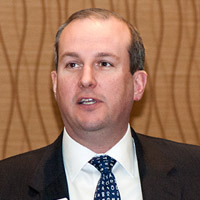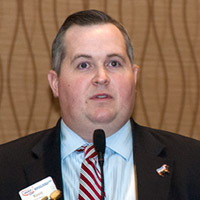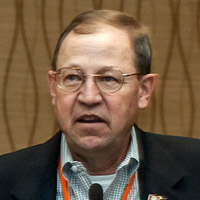NCBA Policy Forum
Forum provides overview of 2014 Farm Bill, looks forward to upcoming issues.
NASHVILLE, Tenn. (Feb. 5, 2014) — It’s important to every cattle operation to routinely pause and take stock of accomplishments and missed opportunities, and to consider the challenges ahead. It’s just as important for organizations like the National Cattlemen’s Beef Association (NCBA), whose members met Feb. 3-7 at the 2014 Cattle Industry Convention in Nashville, Tenn. During the Policy Forum, NCBA members took stock of past and current efforts to influence legislative and regulatory matters that influence their livelihoods. Staffers from the association’s Washington, D.C., office also offered a “heads up” regarding upcoming issues.

Colin Woodall
NCBA Vice President of Public Affairs Colin Woodall complimented lawmakers for passing a federal budget, for the first time in eight years, and for passage of a new Farm Bill. He praised removal of the livestock title, first introduced in 2008, which NCBA has long criticized as needless government interference in livestock marketing. Woodall praised other aspects of the new legislation, including provisions to maintain conservation programs, such as the Environmental Quality Incentives Program (EQIP), and progress in funding agricultural research.
However, Woodall said, the new Farm Bill did not include language to sufficiently protect against release of personal information by the Environmental Protection Agency (EPA) or other regulatory agencies. Neither was there a permanent fix for the “GIPSA Rule” or mandatory country-of-origin labeling (mCOOL). Woodall said NCBA had opposed passage of the bill without changes to address these issues. Noting the likelihood of continued World Trade Organization (WTO) opposition to mCOOL and promised trade retaliation (100% tariffs) by Canada and Mexico, NCBA remains opposed to mCOOL.
“On the positive side,” offered Woodall, “we do have some measure of certainty for the next five years — especially on the disaster-assistance front. That (provision for assistance) was made retroactive to the last two years.”
Woodall said NCBA staff will pay close attention to potential revisions to USDA’s Dietary Guidelines for Americans. Raising concern are early conversations focused on whether beef should be included, based on allegations that production of beef is not sustainable. A goal of NCBA staff will be to ensure that revisions maintain a focus on nutrition, according to the stated purpose of the guidelines.

Kent Bacus
Woodall cited much concern over proposed changes to the EP) definition of “waters of the United States.” It is feared that redefinition will broaden the scope of EPA’s regulatory power to include man-made ditches and floodplains. It was noted that EPA officials have promised to exempt some agricultural operations from increased regulation.
“The EPA has given [livestock producers] a lot of grief, across several administrations,” stated Woodall. “I don’t put much confidence in promises of exemptions.”
Associate Director of Legislative Affairs Kent Bacus also addressed the Forum audience, praising the Obama administration for its support of international trade. Bacus said the administration has asked Congress to enact Trade Promotion Authority (TPA), which allows the President to negotiate trade agreements that Congress can approve or reject, but cannot amend or filibuster.
“We need TPA to give our trade negotiators credibility,” said Bacus, noting opportunities for new trade with Vietnam and unmet demand for U.S. beef in Japan and other countries.

Philip Ellis
Also praised was Idaho Congressman Raul Labrador for championing the Grazing Improvement Act, which promises to improve the livestock grazing permitting process and allows for permit terms of up to 20 years. Also included was an NCBA-favored amendment which makes parties, such as anti-grazing activist groups, responsible for paying all litigation costs when they file lawsuits challenging grazing rights and lose those cases.
Outgoing NCBA Policy Division Chairman Philip Ellis, of Wyoming, encouraged producers to engage in NCBA policy-making processes. He noted how ‘sustainability’ is increasingly part of discussions of legislative and regulatory matters, but the term has no universally accepted definition. Ellis said the beef industry must be involved in clarifying the definition and individual producers must show that beef is sustainable and necessary to feeding a growing global population.
Editor’s Note: The above article was written under contract or by staff of the Angus Journal. It may not be reprinted without express
permission of the Angus Journal. To request reprint permission, contact the editor at 816-383-5200.
www.4cattlemen.com is an event coverage site provided by the Angus Journal editorial team,which publishes the Angus Journal, the Angus Beef Bulletin, the Angus Beef Bulletin EXTRA and the Angus Journal Daily. For questions about this site, to submit an article for our consideration, or to report a broken link, contact the editor at 816-383-5200; 3201 Frederick Ave., Saint Joseph, MO 64506.
The Angus Journal claims copyright
to this website as presented. We welcome educational venues and
cattlemen to link to this site as a service to their audience.

